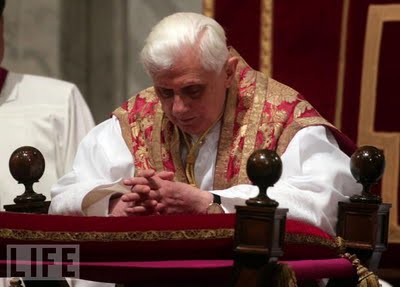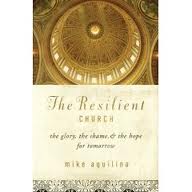“May they become perfectly one“
[powerpress feed=”daily-scripture”]
an excerpt from today’s reflection by Don Schwager:
Do you pray as Jesus did for the unity of all Christians? The distinctive mark of Jesus’disciples is their love and unity. “How good and delightful it is when brethren dwell together in unity†(Psalm 133:1). Jesus’ high priestly prayer at the last supper concludes with the petition for Christian unity among all who profess Jesus Christ as Lord. Jesus prays for all men and women who will come after him and follow him as his disciples. In a special way Jesus prays here for us that as members of his body the church we would be one as he and his Father is one. The unity of Jesus and his Father is a unity of love and obedience and a unity of personal relationship. Because Jesus loved us first and united us in baptism we are called to live in a unity of love. Jesus’ prayer on the eve of his sacrifice shows the great love and trust he has in his beloved disciples. He knows they would abandon him in his hour of trial, yet he entrusted to them the great task of spreading his name throughout the world and to the end of the ages. The Lord entrust us with the same mission – to make him known and loved by all. Jesus died and rose again that all might be one as he and the Father are one. Do you love and accept all baptized Christians as your brothers and sisters in Christ?
“Lord God, have mercy on your people and heal the divisions in the body of Christ. May all Christian people throughout the world attain the unity for which Jesus prayed on the eve of his sacrifice. Renew in us the power of the Spirit that we may be a sign of that unity and a means of its growth. Increase in us a fervent love for all our brothers and sisters in Christ.”
for the full reflection visit : Daily Reading and Meditation
Tags: catholic, catholic podcast, catholic prayer, cathollc spirituality, christian unity, don schwager, gospel of john, jesus christ, Jesus prays
This entry was posted on Thursday, June 9th, 2011 at 6:06 am
You can follow any responses to this entry through the RSS 2.0 feed.
Episode 5 – Whether sacred doctrine is a matter of argument? [powerpress]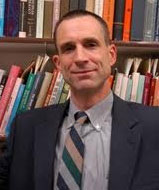
Question 1 Article 8Â Whether sacred doctrine is a matter of argument?
Objection 1: It seems this doctrine is not a matter of argument. For Ambrose says (De Fide 1): “Put arguments aside where faith is sought.” But in this doctrine, faith especially is sought: “But these things are written that you may believe” (Jn. 20:31). Therefore sacred doctrine is not a matter of argument.
Objection 2: Further, if it is a matter of argument, the argument is either from authority or from reason. If it is from authority, it seems unbefitting its dignity, for the proof from authority is the weakest form of proof. But if it is from reason, this is unbefitting its end, because, according to Gregory (Hom. 26), “faith has no merit in those things of which human reason brings its own experience.” Therefore sacred doctrine is not a matter of argument.
On the contrary, The Scripture says that a bishop should “embrace that faithful word which is according to doctrine, that he may be able to exhort in sound doctrine and to convince the gainsayers” (Titus 1:9). 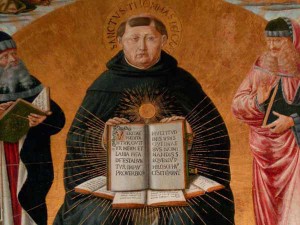
I answer that, As other sciences do not argue in proof of their principles, but argue from their principles to demonstrate other truths in these sciences: so this doctrine does not argue in proof of its principles, which are the articles of faith, but from them it goes on to prove something else; as the Apostle from the resurrection of Christ argues in proof of the general resurrection (1 Cor. 15). However, it is to be borne in mind, in regard to the philosophical sciences, that the inferior sciences neither prove their principles nor dispute with those who deny them, but leave this to a higher science; whereas the highest of them, viz. metaphysics, can dispute with one who denies its principles, if only the opponent will make some concession; but if he concede nothing, it can have no dispute with him, though it can answer his objections. Hence Sacred Scripture, since it has no science above itself, can dispute with one who denies its principles only if the opponent admits some at least of the truths obtained through divine revelation; thus we can argue with heretics from texts in Holy Writ, and against those who deny one article of faith, we can argue from another. If our opponent believes nothing of divine revelation, there is no longer any means of proving the articles of faith by reasoning, but only of answering his objections—if he has any—against faith. Since faith rests upon infallible truth, and since the contrary of a truth can never be demonstrated, it is clear that the arguments brought against faith cannot be demonstrations, but are difficulties that can be answered. (more…)
Tags: catholic, catholic podcast, catholic prayer, cathollc spirituality, christian apologetics, creighton university, faith and reason, first things, summa theologica
This entry was posted on Wednesday, June 8th, 2011 at 7:24 am
You can follow any responses to this entry through the RSS 2.0 feed.
“Sanctified and consecrated in God’s truth“
[powerpress feed=”daily-scripture”]
an excerpt from today’s reflection by Don Schwager:
Do you know why God created you – what purpose and mission he has entrusted to you? Jesus’ aim and mission was to glorify his heavenly Father. All he said and did gave glory to his Father. On the eve of his sacrifice on the cross and in the presence of his disciples, Jesus made his high priestly prayer: “Holy Father, keep them in your name that they may be one as we are one”. Jesus prayed for the unity of his disciples and for all who would believe in him. Jesus’ prayer for his people is that we be united with God the Father in his Son and through his Holy Spirit and be joined together, in unity with all who are members of Christ’s body.
What motivated Jesus to lay down his life on the cross as the atoning sacrifice for the sin of the world? It was love – love for his Father in heaven and love for each and everyone of us who are made in the image and likeness of God. Jesus was sent into the world by his Father for a purpose and that purpose was a mission of love to free us from slavery to sin, Satan, fear, death, and hopelessness. Jesus saw glory in the cross rather than shame. Obedience to his Father’s will was his glory. Jesus kept his Father’s word even when tempted to forgo the cross. Jesus did not rely on his own human resources and strength to accomplish his Father’s will. He trusted in his Father to give him strength, courage, and perseverance in the face of opposition, trials, and temptation. We also must take up our cross and follow the Lord Jesus wherever he may call us. He will give us the strength and power of the Holy Spirit to live as his disciples. John Henry Newman wrote: “God has created me, to do him some definite service; he has committed some work to me which he has not committed to another. I have my mission – I may never know it in this life, but I shall be told it in the next. I am a link in a chain, a bond of connection between persons. He has not created me for nothing. Therefore, I will trust him. Whatever, wherever I am. I cannot be thrown away.“ Do you trust in God and in his call and purpose for your life?
“Lord Jesus, take my life and make it wholly pleasing to you. Sanctify me in your truth and guide me by your Holy Spirit that I may follow you faithfully wherever you lead.”
for the full reflection visit : Daily Reading and Meditation
Tags: catholic, catholic podcast, catholic prayer, cathollc spirituality, don schwager, gospel of john
This entry was posted on Wednesday, June 8th, 2011 at 12:02 am
You can follow any responses to this entry through the RSS 2.0 feed.
“This is eternal life, that they know the Father the only true God”
[powerpress feed=”daily-scripture”]
an excerpt from today’s reflection by Don Schwager:
In his Last Supper discourse Jesus speaks of his glory and the glory of his Father. What is this glory? It is the cross which Jesus speaks of here. How does the cross reveal his glory? In the cross God reveals the breadth of his great love for sinners and the power of redemption which cancels the debt of sin and reverses the curse of our condemnation. Jesus gave his Father the supreme honor and glory through his obedience and willingness to go to the cross. In times of defense the greatest honor belongs not to those who fought and survived but to those who gave the supreme sacrifice of their own lives for their fellow citizens.
Jesus speaks of the Father bringing glory to the Son through the great mystery of the Incarnation and Cross of Christ. God the Father gave us his only begotten Son for our redemption and deliverance from slavery to sin and death. There is no greater proof of God’s love for each and every person on the face of the earth than the Cross of Jesus Christ. In the cross we see a new way of love – a love that is unconditional, sacrificial and generous beyond comprehension.
Jesus also speaks of eternal life. What is eternal life? It is more than simply endless time. Science and medicine today looks for ways to extend the duration of life; but that doesn’t necessarily make life better for us here. Eternal life is qualitative more than quantitative. To have eternal life is to have the life of God within us. When we possess eternal life we experience here and now something of God’s majesty, his peace, joy and love and the holiness which characterizes the life of God. Jesus also speaks of the knowledge of God. Jesus tells his disciples that they can know the only true God. Knowledge of God is not simply limited to knowing something about God, but we can know God personally. The essence of Christianity, and what makes it distinct from Judaism and other religions, is the knowledge of God as our Father. Jesus makes it possible for each of us to personally know God as our Father. To see Jesus is to see what God is like. In Jesus we see the perfect love of God – a God who cares intensely and who yearns over men and women, loving them to the point of laying down his life for them upon the Cross. Jesus is the revelation of God – a God who loves us completely, unconditionally and perfectly. Do you seek unity of heart, mind and will with God and unity of love and peace with your neighbor?
“If only I possessed the grace, good Jesus, to be utterly at one with you! Amidst all the variety of worldly things around me, Lord, the only thing I crave is unity with you. You are all my soul needs. Unite, dear friend of my heart, this unique little soul of mine to your perfect goodness. You are all mine; when shall I be yours? Lord Jesus, my beloved, be the magnet of my heart; clasp, press, unite me for ever to your sacred heart. You have made me for yourself; make me one with you. Absorb this tiny drop of life into the ocean of goodness whence it came.”  (Prayer of Francis de Sales, 1567-1622)
for the full reflection visit : Daily Reading and Meditation
Tags: catholic, catholic podcast, catholic prayer, cathollc spirituality, don schwager, gospel of john
This entry was posted on Tuesday, June 7th, 2011 at 12:01 am
You can follow any responses to this entry through the RSS 2.0 feed.
“In the world you have tribulation; but be of good cheer, I have overcome the world”
[powerpress feed=”daily-scripture”]
an excerpt from today’s reflection by Don Schwager:
How did Jesus convince his disciples that he was the Son of God? Jesus could read their hearts like an open book. He answered their questions before they could even speak them out. And he showed them the glory of God. For a Christian, believing in God cannot be separated from believing in the One he sent, his “beloved Son”, in whom the Father is “well pleased”. We can believe in Jesus and in the words he speaks because he is himself God, the Word made flesh. Since he “has seen the Father,” and is “one with the Father,” Jesus is the only one who knows the Father as he truly is and can reveal him to us. Our faith is “certain” because it is founded on the very word of God who cannot lie. Faith is already the beginning of eternal life. Basil the Great says: “When we contemplte the blessings of faith even now, as if gazing at a reflection in a mirror, it is as if we already possessed the wonderful things which our faith assures us we shall enjoy one day.” Do you nourish and strengthen your faith with the word of God?
In spite of their belief, Jesus warned his disciples that their faith would be put to the test and that they would fail. Jesus spoke plainly about the tragedy of betrayal and the triumph of the cross. Jesus knew the hearts of his disciples better than they knew. He knew they would desert him in his hour of trial. Such knowledge could have easily led to bitterness and rejection. Jesus met the injury of betrayal and disloyalty with supreme love and trust in his disciples. He loved his disciples to the very end even when they left him alone to die on the cross. He knew that the cross would not bring defeat but victory over sin and death. Jesus speaks the same word to us today. “My love for you is unconditional and I will never abandon you.” While we cannot avoid all pain and suffering in this life, Jesus, nonetheless assures us that he will guide us safely through any difficulty or trial we may have to undergo for his sake. Jesus calls each of us to take courage, because he has overcome the world. The Holy Spirit gives us a living hope in the power of the resurrection and a confident trust in God’s abiding presence. Nothing can overcome this faith and hope in Christ’s victory – no trial, suffering, temptation, or testing. The Holy Spirit gives us the strength and courage we need to overcome adversity and to persevere in faith. Do you believe that nothing can separate you from the love of God in Christ Jesus (see Romans 8:38-39)?
“Lord Jesus, help me to trust in your saving power, especially when I meet adversities and trials. Give me your peace when I am troubled and let me know the joy of your victory over sin and death.”
for the full reflection visit : Daily Reading and Meditation
Tags: catholic, catholic podcast, catholic prayer, cathollc spirituality, don schwager, gospel of john
This entry was posted on Monday, June 6th, 2011 at 12:02 am
You can follow any responses to this entry through the RSS 2.0 feed.
Episode 4 -Listening For Truth– Encountering fear in prayer.  The necessity for spiritual direction!  Purification as part of the process for spiritual growth.  The virtue of Obedience.
Encountering fear in prayer.  The necessity for spiritual direction!  Purification as part of the process for spiritual growth.  The virtue of Obedience.
[powerpress]
Deacon James Keating, PhD, the director of Theological Formation for the Institute for Priestly Formation, located at Creighton University, in Omaha, is making available to â€Discerning Hearts†and all who listen, his series of programs entitled “Listening For Truthâ€.
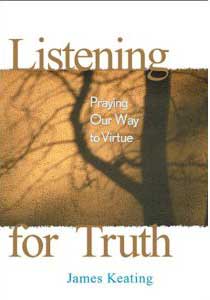 Listening for Truth leads men and women in a search for a fuller experience of God that begins in prayer, grows in the rediscovery of our spiritual being, and grounds itself in the truth of Jesus Christ. A presentation of the Christian life as an engagement of the whole person — body, mind, and soul — in the challenge of daily living.
Listening for Truth leads men and women in a search for a fuller experience of God that begins in prayer, grows in the rediscovery of our spiritual being, and grounds itself in the truth of Jesus Christ. A presentation of the Christian life as an engagement of the whole person — body, mind, and soul — in the challenge of daily living.
For more information on the “Institute of Priestly Formation†and for other material available by Deacon Keating, just click here
Don’t forget to pickup a copy of “Communion with Christ†, it is one of the best audio sets on prayer…ever!
Check out Deacon Keating’s “Discerning Heart†page
Tags: catholic, catholic podcast, catholic prayer, cathollc spirituality, creighton university, Deacon James Keating, Deacon Keating, institute for priestly formation, prayer, spiritual formation, the Institute for Priestly Formation, theological formation
This entry was posted on Saturday, June 4th, 2011 at 8:06 am
You can follow any responses to this entry through the RSS 2.0 feed.
Episode 2 – Seeking Truth with Sharon Doran, hosted by Bruce McGregor. Â Ep 2 – The Prologue to the Holy Gospel According to St. John.
Holy Gospel According to St. John.
[powerpress]
Sharon Doran serves as the teaching director of “Seeking Truth.†An experienced Bible Study teacher, Sharon has a passion for scripture that will motivate and challenge you to immerse yourself in God’s Word and apply His message to your every day life.
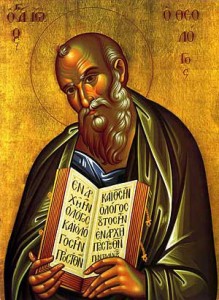 Episode 2 – The Prologue to the Gospel According to St. John. Â Sharon and Bruce also discuss many aspects of a central tenet of our faith…The Trinity and the divinity of Jesus. They also talk about John the Baptist, Moses and the Ark of the Covenant, as well as the influence of the Early Church Fathers.
Episode 2 – The Prologue to the Gospel According to St. John. Â Sharon and Bruce also discuss many aspects of a central tenet of our faith…The Trinity and the divinity of Jesus. They also talk about John the Baptist, Moses and the Ark of the Covenant, as well as the influence of the Early Church Fathers.
 “Seeking Truth†is an in depth Catholic Bible Study, commissioned by the Archdiocese of Omaha in response to John Paul II’s call to the New Evangelization as well as Pope Benedict XVI’s exhortation for all Catholics to study scripture. To learn more go to: www.seekingtruth.net
“Seeking Truth†is an in depth Catholic Bible Study, commissioned by the Archdiocese of Omaha in response to John Paul II’s call to the New Evangelization as well as Pope Benedict XVI’s exhortation for all Catholics to study scripture. To learn more go to: www.seekingtruth.net
Tags: catholic, catholic podcast, catholic prayer, cathollc spirituality, gospel of john, seeking truth, Sharon, Sharon Doran, The Prologue
This entry was posted on Thursday, June 2nd, 2011 at 3:35 pm
You can follow any responses to this entry through the RSS 2.0 feed.
“While Jesus blessed them, he parted from them, and was carried up into heaven”
[powerpress feed=”daily-scripture”]
an excerpt from today’s reflection by Don Schwager:
Why did Jesus leave his disciples forty days after his resurrection? Forty is a significant number in the scriptures. Moses went to the mountain to seek the face of God for forty days in prayer and fasting. The people of Israel were in the wilderness for forty years in preparation for their entry into the promised land. Elijah fasted for forty days as he journeyed in the wilderness to the mountain of God. For forty days after his resurrection Jesus appeared numerous times to his disciples to assure them that he had risen indeed and to prepare them for the task of carrying on the work which he began during his earthy ministry.
Jesus’ departure and ascension was both an end and a beginning for his disciples. While it was the end of Jesus’ physical presence with his beloved disciples, it marked the beginning of Jesus’ presence with them in a new way. Jesus promised that he would be with them always to the end of time (Matthew 28:20). Now as the glorified and risen Lord and Savior, ascended to the right hand of the Father in heaven, Jesus 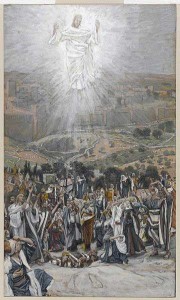 promised to send them the Holy Spirit who would anoint them with power on the Feast of Pentecost, just as Jesus was anointed for his ministry at the River Jordan. When the Lord Jesus departed physically from the apostles, they were not left in sorrow or grief. Instead, they were filled with joy and with great anticipation for the coming of the Holy Spirit.
promised to send them the Holy Spirit who would anoint them with power on the Feast of Pentecost, just as Jesus was anointed for his ministry at the River Jordan. When the Lord Jesus departed physically from the apostles, they were not left in sorrow or grief. Instead, they were filled with joy and with great anticipation for the coming of the Holy Spirit.
Jesus’ last words to his apostles point to his saving mission and to their mission to be witnesses of his saving death and his glorious resurrection and to proclaim the good news of salvation to all the world. Their task is to proclaim the gospel – the good news of salvation – not only to the people of Israel, but to all the nations as well. God’s love and gift of salvation is not reserved for a few or for one nation alone, but it is for the whole world – for all who will accept it. The gospel is the power of God, the power to release people from their burden of guilt, sin, and oppression, and the power to heal, restore, and make us whole. Do you believe in the power of the gospel?
This is the great commission which the risen Christ gives to the whole church. All believers have been given a share in this task – to be heralds of the good news and ambassadors for Jesus Christ, the only savior of the world. We have not been left alone in this task, for the risen Lord works in and through us by the power of his Holy Spirit. Today we witness a new Pentecost as the Lord pours out his Holy Spirit upon his people to renew and strengthen the body of Christ and to equip it for effective ministry and mission world-wide. Do you witness to others the joy of the gospel and the hope of the resurrection?
“Lord Jesus, through the gift of your Holy Spirit, you fill us with an indomitable spirit of praise and joy which no earthly trial can subdue. Fill me with your resurrection joy and help me to live a life of praise and thanksgiving for your glory. May I witness to those around me the joy of the gospel and the reality of your resurrection.â€
for the full reflection visit : Daily Reading and Meditation
Tags: catholic, catholic podcast, catholic prayer, cathollc spirituality, don schwager, gospel of luke
This entry was posted on Thursday, June 2nd, 2011 at 12:17 am
You can follow any responses to this entry through the RSS 2.0 feed.
Episode 4-Whether this doctrine is the same as wisdom?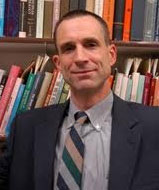
[powerpress]
Question 1 Article 6 Whether this doctrine is the same as wisdom??
Objection 1: It seems that this doctrine is not the same as wisdom. For no doctrine which borrows its principles is worthy of the name of wisdom; seeing that the wise man directs, and is not directed (Metaph. i). But this doctrine borrows its principles. Therefore this science is not wisdom.
Objection 2: Further, it is a part of wisdom to prove the principles of other sciences. Hence it is called the chief of sciences, as is clear in Ethic. vi. But this doctrine does not prove the principles of other sciences. Therefore it is not the same as wisdom.
Objection 3: Further, this doctrine is acquired by study, whereas wisdom is acquired by God’s inspiration; so that it is numbered among the gifts of the Holy Spirit (Is. 11:2). Therefore this doctrine is not the same as wisdom.
 On the contrary, It is written (Dt. 4:6): “This is your wisdom and understanding in the sight of nations.”
On the contrary, It is written (Dt. 4:6): “This is your wisdom and understanding in the sight of nations.”
I answer that, This doctrine is wisdom above all human wisdom; not merely in any one order, but absolutely. For since it is the part of a wise man to arrange and to judge, and since lesser matters should be judged in the light of some higher principle, he is said to be wise in any one order who considers the highest principle in that order: thus in the order of building, he who plans the form of the house is called wise and architect, in opposition to the inferior laborers who trim the wood and make ready the stones: “As a wise architect, I have laid the foundation” (1 Cor. 3:10). Again, in the order of all human life, the prudent man is called wise, inasmuch as he directs his acts to a fitting end: “Wisdom is prudence to a man” (Prov. 10: 23). Therefore he who considers absolutely the highest cause of the whole universe, namely God, is most of all called wise. Hence wisdom is said to be the knowledge of divine things, as Augustine says (De Trin. xii, 14). But sacred doctrine essentially treats of God viewed as the highest cause—not only so far as He can be known through creatures just as philosophers knew Him—“That which is known of God is manifest in them” (Rm. 1:19)—but also as far as He is known to Himself alone and revealed to others. Hence sacred doctrine is especially called wisdom.
Reply to Objection 1: Sacred doctrine derives its principles not from any human knowledge, but from the divine knowledge, through which, as through the highest wisdom, all our knowledge is set in order.
Reply to Objection 2: The principles of other sciences either are evident and cannot be proved, or are proved by natural reason through some other science. But the knowledge proper to this science comes through revelation and not through natural reason. Therefore it has no concern to prove the principles of other sciences, but only to judge of them. Whatsoever is found in other sciences contrary to any truth of this science must be condemned as false: “Destroying counsels and every height that exalteth itself against the knowledge of God” (2 Cor. 10:4,5).
Reply to Objection 3: Since judgment appertains to wisdom, the twofold manner of judging produces a twofold wisdom. A man may judge in one way by inclination, as whoever has the habit of a virtue judges rightly of what concerns that virtue by his very inclination towards it. Hence it is the virtuous man, as we read, who is the measure and rule of human acts. In another way, by knowledge, just as a man learned in moral science might be able to judge rightly about virtuous acts, though he had not the virtue. The first manner of judging divine things belongs to that wisdom which is set down among the gifts of the Holy Ghost: “The spiritual man judgeth all things” (1 Cor. 2:15). And Dionysius says (Div. Nom. ii): “Hierotheus is taught not by mere learning, but by experience of divine things.” The second manner of judging belongs to this doctrine which is acquired by study, though its principles are obtained by revelation.
For an online version of St. Thomas Aquinas’ “Summa” click here
“Christian Apologetics with Dr. R. R. Reno” explores numerous facets of faith and reason in the life of the Church and the world. Grounded on the work of giants, such as St. Thomas Aquinas, St. Bonaventure, Blessed John Newman, soon-to-be Blessed John Paul II, G. K. Chesterton, Blaise Pascal and Stephen Barr, Dr. Reno helps us to open our minds to make the journey to our hearts.
R. R. Reno is the editor at First Things: A Journal of Religion, Culture, and Public Life, and Professor of Theology, currently on leave from Creighton University. His theological work has been published in many academic journals. Essays and opinion pieces on religion, public life, contemporary culture, and current events have appeared in Commentary, and the Washington Post. In Fighting the Noonday Devil Reno suggests that putting ourselves at the disposal of what is real is what trains us for true piety. His other recent books include Genesis: Brazos Theological Commentary on the Bible and Sanctified Vision: An Introduction to Early Christian Interpretation of the Bible.
Tags: catholic, catholic podcast, catholic prayer, cathollc spirituality, christian apologetics, first things, st thomas aquinas
This entry was posted on Wednesday, June 1st, 2011 at 3:54 pm
You can follow any responses to this entry through the RSS 2.0 feed.
[powerpress feed = “devotionals-prayers”]
JUNE 2011
General Intention: That priests, united to the Heart of Christ, may always be true witnesses of the caring and merciful love of God.
Missionary Intention: That the Holy Spirit may bring forth from our communities numerous missionary vocations, willing to fully consecrate themselves to spreading the Kingdom of God.
Tags: catholic, catholic podcast, catholic prayer, cathollc spirituality, pope benedict xvi, prayer
This entry was posted on Wednesday, June 1st, 2011 at 12:03 am
You can follow any responses to this entry through the RSS 2.0 feed.
Episode 5– Light in the Dark Ages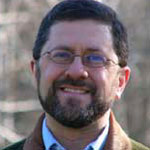
The Resilient Church with Mike Aquilina, offers a fascinating look at the trials and triumphs of the Catholic Church over the past two thousand years. Fast-paced sketches of critical periods in church history give readers perspective on the challenges faced by the church today. Mike Aquilina does not shrink from the realities of the past, including badly behaved leaders and those who betrayed the Lord. Yet he also leaves us all with well-founded hope for the future: God remains faithful in every circumstance and fulfills his promise to remain with his church always. Hosted by Kris McGregor
Also visit Mike’s “Discerning Hearts†page for more audio downloads and information!
Tags: benedictines, catholic, catholic podcast, catholic prayer, cathollc spirituality, Light in the Dark Ages The Resilient Church, middle ages, mike aquilina, Resilient Church, st. paul center for biblical theology
This entry was posted on Tuesday, May 31st, 2011 at 7:03 pm
You can follow any responses to this entry through the RSS 2.0 feed.
Episode 1 – Seeking Truth with Sharon Doran, hosted by Bruce McGregor.  Ep 1 – An Introduction to the life and work of  St. John.
[powerpress]
 Sharon Doran serves as the teaching director of “Seeking Truth.†An experienced Bible Study teacher, Sharon has a passion for scripture that will motivate and challenge you to immerse yourself in God’s Word and apply His message to your every day life.
Sharon Doran serves as the teaching director of “Seeking Truth.†An experienced Bible Study teacher, Sharon has a passion for scripture that will motivate and challenge you to immerse yourself in God’s Word and apply His message to your every day life.
 Episode 1 – An Introduction to the life and work of St. John. Â Sharon and Bruce also discuss many aspects of Sacred Scripture and the importance of why serious study should be guided by the Church. Â And why everyone should know, value and treasure the gift of God’s Word.
Episode 1 – An Introduction to the life and work of St. John. Â Sharon and Bruce also discuss many aspects of Sacred Scripture and the importance of why serious study should be guided by the Church. Â And why everyone should know, value and treasure the gift of God’s Word.
 “Seeking Truthâ€Â is an in depth Catholic Bible Study, commissioned by the Archdiocese of Omaha in response to John Paul II’s call to the New Evangelization as well as Pope Benedict XVI’s exhortation for all Catholics to study scripture.  To learn more go to:  www.seekingtruth.net
“Seeking Truthâ€Â is an in depth Catholic Bible Study, commissioned by the Archdiocese of Omaha in response to John Paul II’s call to the New Evangelization as well as Pope Benedict XVI’s exhortation for all Catholics to study scripture.  To learn more go to:  www.seekingtruth.net
Tags: catholic, catholic podcast, catholic prayer, cathollc spirituality
This entry was posted on Wednesday, May 25th, 2011 at 1:42 pm
You can follow any responses to this entry through the RSS 2.0 feed.
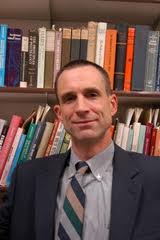 Episode 3- Whether sacred doctrine (theology) is nobler than other sciences?
Episode 3- Whether sacred doctrine (theology) is nobler than other sciences?
[powerpress]
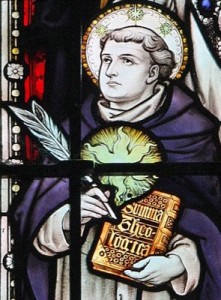 Question 1 Article 5 Whether sacred doctrine is nobler than other sciences?
Question 1 Article 5 Whether sacred doctrine is nobler than other sciences?
Objection 1: It seems that sacred doctrine is not nobler than other sciences; for the nobility of a science depends on the certitude it establishes. But other sciences, the principles of which cannot be doubted, seem to be more certain than sacred doctrine; for its principles—namely, articles of faith—can be doubted. Therefore other sciences seem to be nobler.
Objection 2: Further, it is the sign of a lower science to depend upon a higher; as music depends on arithmetic. But sacred doctrine does in a sense depend upon philosophical sciences; for Jerome observes, in his Epistle to Magnus, that “the ancient doctors so enriched their books with the ideas and phrases of the philosophers, that thou knowest not what more to admire in them, their profane erudition or their scriptural learning.” Therefore sacred doctrine is inferior to other sciences.
On the contrary, Other sciences are called the handmaidens of this one: “Wisdom sent her maids to invite to the tower” (Prov. 9:3).
I answer that, Since this science is partly speculative and partly practical, it transcends all others speculative and practical. Now one speculative science is said to be nobler than another, either by reason of its greater certitude, or by reason of the higher worth of its subject-matter. In both these respects this science surpasses other speculative sciences; in point of greater certitude, because other sciences derive their certitude from the natural light of human reason, which can err; whereas this derives its certitude from the light of divine knowledge, which cannot be misled: in point of the higher worth of its subject-matter because this science treats chiefly of those things which by their sublimity transcend human reason; while other sciences consider only those things which are within reason’s grasp. Of the practical sciences, that one is nobler which is ordained to a further purpose, as political science is nobler than military science; for the good of the army is directed to the good of the State. But the purpose of this science, in so far as it is practical, is eternal bliss; to which as to an ultimate end the purposes of every practical science are directed. Hence it is clear that from every standpoint, it is nobler than other sciences.
Reply to Objection 1: It may well happen that what is in itself the more certain may seem to us the less certain on account of the weakness of our intelligence, “which is dazzled by the clearest objects of nature; as the owl is dazzled by the light of the sun” (Metaph. ii, lect. i). Hence the fact that some happen to doubt about articles of faith is not due to the uncertain nature of the truths, but to the weakness of human intelligence; yet the slenderest knowledge that may be obtained of the highest things is more desirable than the most certain knowledge obtained of lesser things, as is said in de Animalibus xi.
Reply to Objection 2: This science can in a sense depend upon the philosophical sciences, not as though it stood in need of them, but only in order to make its teaching clearer. For it accepts its principles not from other sciences, but immediately from God, by revelation. Therefore it does not depend upon other sciences as upon the higher, but makes use of them as of the lesser, and as handmaidens: even so the master sciences make use of the sciences that supply their materials, as political of military science. That it thus uses them is not due to its own defect or insufficiency, but to the defect of our intelligence, which is more easily led by what is known through natural reason (from which proceed the other sciences) to that which is above reason, such as are the teachings of this science.
For an online version of St. Thomas Aquinas’ “Summa” click here
“Christian Apologetics with Dr. R. R. Reno” explores numerous facets of faith and reason in the life of the Church and the world. Grounded on the work of giants, such as St. Thomas Aquinas, St. Bonaventure, Blessed John Newman, soon-to-be Blessed John Paul II, G. K. Chesterton, Blaise Pascal and Stephen Barr, Dr. Reno helps us to open our minds to make the journey to our hearts.
R. R. Reno is the editor at First Things: A Journal of Religion, Culture, and Public Life, and Professor of Theology, currently on leave from Creighton University. His theological work has been published in many academic journals. Essays and opinion pieces on religion, public life, contemporary culture, and current events have appeared in Commentary, and the Washington Post. In Fighting the Noonday Devil Reno suggests that putting ourselves at the disposal of what is real is what trains us for true piety. His other recent books include Genesis: Brazos Theological Commentary on the Bible and Sanctified Vision: An Introduction to Early Christian Interpretation of the Bible.
Tags: catholic, catholic podcast, catholic prayer, cathollc spirituality, philosophical sciences, sacred doctrine, st thomas aquinas, summa theologica, theology
This entry was posted on Tuesday, May 24th, 2011 at 5:42 pm
You can follow any responses to this entry through the RSS 2.0 feed.
 Episode 2- What is the relationship between religion and science?
Episode 2- What is the relationship between religion and science?
[powerpress]
 Question 1 Article 2. Whether sacred doctrine is a science.
Question 1 Article 2. Whether sacred doctrine is a science.
Objection 1: It seems that sacred doctrine is not a science. For every science proceeds from self-evident principles. But sacred doctrine proceeds from articles of faith which are not self-evident, since their truth is not admitted by all: “For all men have not faith” (2 Thess. 3:2). Therefore sacred doctrine is not a science.
Objection 2: Further, no science deals with individual facts. But this sacred science treats of individual facts, such as the deeds of Abraham, Isaac and Jacob and such like. Therefore sacred doctrine is not a science.
On the contrary, Augustine says (De Trin. xiv, 1) “to this science alone belongs that whereby saving faith is begotten, nourished, protected and strengthened.” But this can be said of no science except sacred doctrine. Therefore sacred doctrine is a science.
I answer that, Sacred doctrine is a science. We must bear in mind that there are two kinds of sciences. There are some which proceed from a principle known by the natural light of intelligence, such as arithmetic and geometry and the like. There are some which proceed from principles known by the light of a higher science: thus the science of perspective proceeds from principles established by geometry, and music from principles established by arithmetic. So it is that sacred doctrine is a science because it proceeds from principles established by the light of a higher science, namely, the science of God and the blessed. Hence, just as the musician accepts on authority the principles taught him by the mathematician, so sacred science is established on principles revealed by God.
Reply to Objection 1: The principles of any science are either in themselves self-evident, or reducible to the conclusions of a higher science; and such, as we have said, are the principles of sacred doctrine.
Reply to Objection 2: Individual facts are treated of in sacred doctrine, not because it is concerned with them principally, but they are introduced rather both as examples to be followed in our lives (as in moral sciences) and in order to establish the authority of those men through whom the divine revelation, on which this sacred scripture or doctrine is based, has come down to us.
For an online version of St. Thomas Aquinas’ “Summa” click here
“Christian Apologetics with Dr. R. R. Reno” explores numerous facets of faith and reason in the life of the Church and the world. Grounded on the work of giants, such as St. Thomas Aquinas, St. Bonaventure, Blessed John Newman, soon-to-be Blessed John Paul II, G. K. Chesterton, Blaise Pascal and Stephen Barr, Dr. Reno helps us to open our minds to make the journey to our hearts.
R. R. Reno is the editor at First Things: A Journal of Religion, Culture, and Public Life, and Professor of Theology, currently on leave from Creighton University. His theological work has been published in many academic journals. Essays and opinion pieces on religion, public life, contemporary culture, and current events have appeared in Commentary, and the Washington Post. In Fighting the Noonday Devil Reno suggests that putting ourselves at the disposal of what is real is what trains us for true piety. His other recent books include Genesis: Brazos Theological Commentary on the Bible and Sanctified Vision: An Introduction to Early Christian Interpretation of the Bible.
Tags: catholic, catholic podcast, catholic prayer, cathollc spirituality, christian apologetics, creighton university, faith, first things, r r reno, relationship, religion, science, st thomas aquinas, summa theologica
This entry was posted on Monday, May 23rd, 2011 at 12:11 am
You can follow any responses to this entry through the RSS 2.0 feed.
Episode 4 – Heresy and Orthodoxy
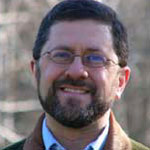 The Resilient Church with Mike Aquilina, offers a fascinating look at the trials and triumphs of the Catholic Church over the past two thousand years. Fast-paced sketches of critical periods in church history give readers perspective on the challenges faced by the church today. Mike Aquilina does not shrink from the realities of the past, including badly behaved leaders and those who betrayed the Lord. Yet he also leaves us all with well-founded hope for the future: God remains faithful in every circumstance and fulfills his promise to remain with his church always. Hosted by Kris McGregor
The Resilient Church with Mike Aquilina, offers a fascinating look at the trials and triumphs of the Catholic Church over the past two thousand years. Fast-paced sketches of critical periods in church history give readers perspective on the challenges faced by the church today. Mike Aquilina does not shrink from the realities of the past, including badly behaved leaders and those who betrayed the Lord. Yet he also leaves us all with well-founded hope for the future: God remains faithful in every circumstance and fulfills his promise to remain with his church always. Hosted by Kris McGregor
Also visit Mike’s “Discerning Hearts†page for more audio downloads and information!
Tags: catholic, catholic podcast, catholic prayer, cathollc spirituality, church history, heresy, mike aquilina, orthodoxy, Resilient Church, st. paul center for biblical theology
This entry was posted on Thursday, May 19th, 2011 at 10:31 pm
You can follow any responses to this entry through the RSS 2.0 feed.




